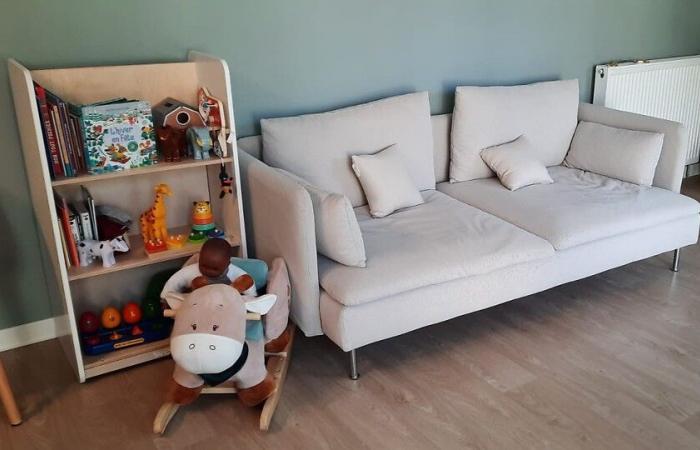Two and a half months after its opening, it is a unique place in Champagne-Ardenne which was officially inaugurated by the Reims University Hospital this Friday, November 29: a parent-baby day care intended to support parents in difficulty with their children from birth to 18 months. This place completes the offer of the perinatal and early childhood unit of the CHU.
Don't feel like you're in the hospital
When we pass the door, we enter a welcoming place with a living room, a kitchen, a bathroom, a baby room with several beds and various warm rooms with velvet armchairs, toys and soothing colors. “We don’t feel like we’re in a hospital. We feel like we’re at home, surrounded by professionals, without us realizing it”explains Emeline, 27, who has been coming to the day center twice a week for two months with her 14-month-old daughter. “Already we feel less alone. Talking with other mothers who have the same difficulties and also with professionals, that reassures. It allows you to gain self-confidence. When I leave here, I'm happy. I feel lighter.”
And this is the objective of the team made up of two childcare nurses, a nurse, a psychomotor therapist, a psychologist and a psychiatrist, Dr Julie Auer, responsible for day care: “The idea is to establish a climate of trust and kindness.” All the mothers welcomed are addressed by a professional, for various difficulties : “It could be difficulties for the mother in her own motherhood but also difficulties for the baby with eating disorders or sleeping disorders. And then it can also be difficulties in the mother-baby bond.”
Soline Demestre
Here mothers are welcomed for a long time, half day or full dayor even two per week, in groups of four, with their children, for cooking, sophrology or even motor skills workshops, accompanied by psychological follow-up. “A reception over a long period of time also allows you to better perceive the difficulties than a traditional consultation. It allows mothers to take the time to talk, continues Dr. Auer, but also for us to observe what creates difficulty, for example, in the mother-baby bond, to then be able to better support them.“

Soline Demestre
“Here I don’t need to pretend”
Elizabeth is 39 years old. She is a stay-at-home mother of four girls aged 19, 8, 4 and 8 months. Her husband, a farmer, works a lot but everything went well for his first two daughters. It was with the birth of the third that everything changed. She became depressed after a serious health problem during childbirth. After the birth of her youngest, her psychiatrist referred her to the brand new parent-baby day care center. After coming twice a week, she now comes one day a week and since then she feels better : “It's a bit of a way for me to get out of the house, to see mothers like me with doubts and fears and above all to realize that I am not alone in my corner. And it’s actually relieving. I don't feel like I'm in the hospital but like I'm here to chat with friends and professionals. Here, I don't need to pretend. If things don't go well, I cry. If I'm stressed, I say so. People ask me how I am, if I slept well, what I need. At home we are not necessarily asked. Rather, we are asked to do things when here there is kindness and well-being for the mother and the child. There I feel like I've made a leap. In a few months, I feel like I've made progress whereas for four years I've had the impression of stagnating and I think that this place helps with that, to actually be yourself.”
The parent-baby day center has obtained annual financial support of 400,000 euros from the Grand Est Regional Health Agency and the general direction of care provision as part of a call for projects “Perinatal Psychiatry and child and adolescent psychiatry 2022”. Since opening in mid-September, around twenty mothers have been welcomed there.

salt demestra









